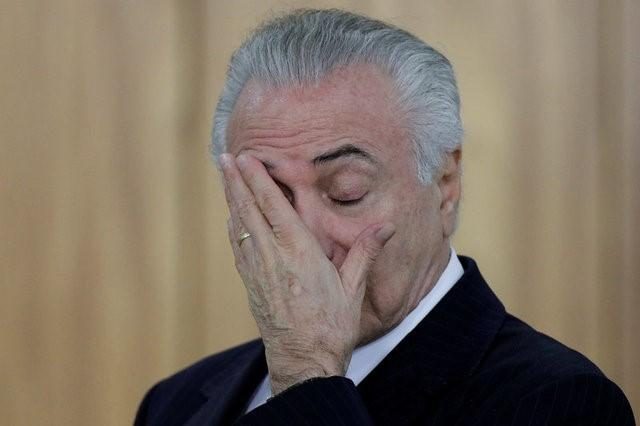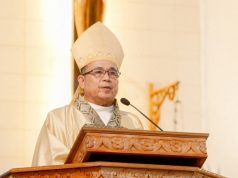
BRASILIA — (UPDATE – 10:10 a.m.) Brazil’s top federal prosecutor charged President Michel Temer with taking multimillion-dollar bribes on Monday in a stinging blow to the unpopular leader and to political stability in Latin America’s largest country.
Rodrigo Janot submitted the charge in a document presented to the Supreme Court, saying “he fooled Brazilian citizens” and owed the nation millions in compensation for accepting bribes.
Under Brazilian law, the lower house of Congress must now vote on whether to allow the top tribunal to try the conservative leader, who replaced impeached leftist President Dilma Rousseff just over a year ago.
Lawmakers within Temer’s coalition are confident they have the votes to block the two-third majority required to proceed with a trial. But they warn that support may wane if congressmen are forced to vote several times to protect Temer — whose popularity is languishing in the single-digits — from trial.
Temer’s office and his attorney, Antonio Mariz, declined to comment on the charges. Temer has repeatedly said he is innocent of any wrongdoing.
Investigators have uncovered stunning levels of corruption in recent years engulfing Brazil’s political class and business elites. Much of it centers on companies paying billions of dollars in bribes to politicians and executives at state-run enterprises in return for lucrative contracts.
Temer and one-third of his cabinet, as well as four former presidents and dozens of lawmakers are under investigation or already charged in the schemes. Over 90 people have been convicted.
Political analysts had warned, long before Monday, that the scandals reduced the chances Temer could push through reforms crucial for Latin America’s biggest economy to rebound from its worst recession on record.
Temer was charged in connection with a graft scheme involving the world’s largest meatpacker, JBS SA. Executives said in plea bargain testimony the president took bribes for resolving tax matters, freeing up loans from state-run banks and other matters.
Monday’s charging document alleges Temer arranged to eventually receive a total of 38 million reais ($11.5 million) from JBS in the next nine months.
Joesley Batista, one of the brothers who control JBS, recorded a conversation with Temer in March in which the president appears to condone bribing a potential witness. Batista also accused Temer and aides of negotiating millions of dollars in illegal donations for his Brazilian Democratic Movement Party.
Brazil’s federal police released a separate document on Monday about that conversation with Batista. Police recovered a previously inaudible portion of the recording in which Temer is heard telling the scandal-plagued billionaire that it was mainly because of his influence that he chose to appoint Henrique Meirelles as finance minister.
The significance of the comment about Meirelles, who is widely respected in financial markets, was not immediately clear and the finance ministry did not respond to requests for comment.
Legal gridlock
Key lawmakers in Temer’s alliance told Reuters, on condition of anonymity, they would halt work on proposed labor reforms if forced to vote on charges against the president.
Temer’s supporters say they have between 250 and 300 votes in the 513 seat lower house to block a trial. But the president is expected to soon face charges of racketeering and obstruction of justice, each requiring a separate vote. Prosecutors have said they may also file other charges, which they have not yet given details on.
On Monday, the federal police recommended charging Temer with obstruction of justice – the first step toward a likely round of other charges in addition to graft.
Top lawmakers said Janot’s expected strategy of presenting charges one at a time would throw Temer’s future into uncertainty.
With all of congress facing re-election next year, many said that if public outrage boiled over, it would be hard to maintain support for Temer.
“If this grinds on with multiple votes, you may start to see a lack of governability,” said one top lawmaker in Temer’s coalition. “In that case, there will be defections, and colleagues may start to move against Temer.”
Carlos Melo, a political scientist with Insper, a Sao Paulo business school, said Janot knew he would lose the first corruption charge against Temer “but he is like a chess player, thinking two or three votes down the line.”
Melo said the votes by lawmakers, many of whom are facing their own corruption investigations, would be a test of how alienated Brazil’s political class was from an increasingly angry population.
“If Congress has any connection left whatsoever with the society it represents, then Janot’s strategy of wearing lawmakers down with multiple votes will win and you will see the president put on trial,” Melo said.
If congressmen rally around Temer, Melo said, “then we must face the horrific fact that what we have is a political system entirely detached from society, and it will pay the price in next year’s election.”









